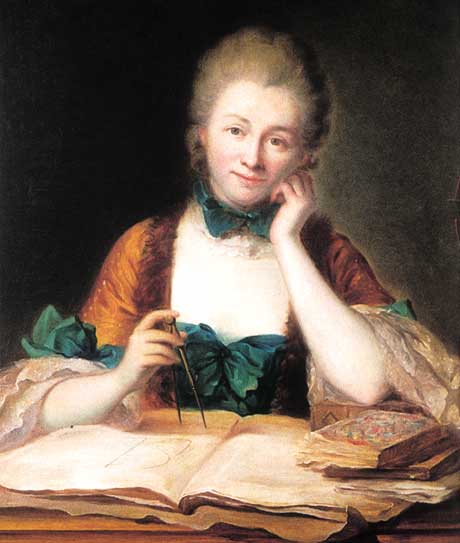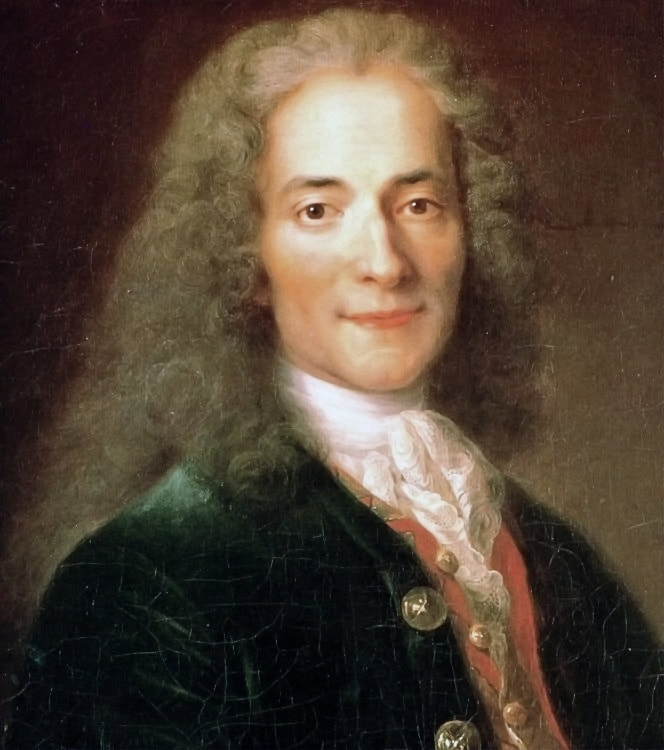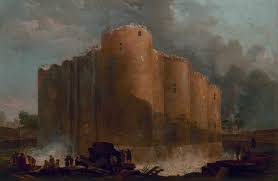Lesson 13
A Frenchwoman Ahead of Her Time: The story of Émilie du Châtelet's wild life and the equation she discovered.
A Frenchwoman Ahead of Her Time: The story of Émilie du Châtelet's wild life and the equation she discovered.
|
Think gorgeous. Add brains (lots). Charm (much). Riches (a 30-room childhood home with 17 servants, for a start). Then include a desire to work hard and accomplish important things.
You’re looking at Émilie du Châtelet. Émilie worries her father. Eighteenth-century French girls aren’t supposed to be smart, or if they are, they aren’t supposed to show it. “My youngest flaunts her mind, and frightens away the suitors.... We don’t know what to do with her,” says her dad. But he does understand that he has an unusual daughter--one who will become a leading mathematician of her time--and he sees to it that she has a good education. Then, on her own (women aren’t allowed in universities) and with the help of tutors, Émilie studies the great mathematicians of her time: Newton, Leibniz, and Descartes. Only a few people, male or female, are able to do that. When she takes fencing lessons, she becomes good enough to scare off clumsy challengers. And as to games of cards—which are fascinating the rich of the time—Émilie easily memorizes every card played and figures out the mathematical probabilities of various moves. But gambling being chance, not science, she often loses at the blackjack table. Still, she is in a league of her own. Can you imagine her at the French court of Versailles (ver-SY), where most beautiful young women just sigh and flutter their eyelashes? “My daughter is mad,” her father writes in frustration. “Last week she won more than two thousand louis [French money then] at the card tables, and after ordering new gowns ...she spent the other half on new books....She would not understand that no great lord will marry a woman who is seen reading every day.” Émilie isn’t eager to marry, but at 19 (a late age in her crowd), she is talked into marrying a handsome 34-year-old officer, Florent-Claude du Châtelet-Lomont. She becomes a marquise (mar-KEEZ; it’s like a duchess) and has three children. But Florent-Claude spends most of his time soldiering; he is hardly ever home. They have little in common and agree to live separate lives. Then she falls in love. It is with a Frenchman who is a renowned writer and philosopher. His name is François-Marie Arouet; his pen name is Voltaire. This is what he writes: “I was tired of the lazy, quarrelsome life led at Paris....In the year 1733 I met a young lady who happened to think nearly as I did.” (When it comes to math and science, she thinks even better than he does.) Voltaire is a playwright, historian, poet, political essayist, and one of the best writers of satire of all time. He likes to poke fun at the decadent lifestyle and empty-headedness of the ruling classes. He even attacked the Church. And, to make things worse for himself, he says he doesn’t believe in God. Eighteenth-century France, like most nations then (and some now), didn’t allow much freedom of expression. If you wrote or said the wrong thing, you could be thrown in jail, which happened to Voltaire more than once. Satire is funny if you are a reader; it is not funny at all if you are being satirized. One article he wrote got him sent to France’s infamous political prison, the Bastille. He was locked in there for 11 months. But he did have his books and paper—and good food too. (This was France.) He managed to write an epic poem and revise a play. Finally he was released, but being in the Bastille didn’t seem to teach Voltaire a lesson. A few years later, he ran afoul of a rich aristocrat, who hired some thugs to beat him up. This was serious. A warrant was issued for Voltaire’s arrest. After some plea-bargaining and pleas from his friends, he agreed to leave the country. Voltaire went to England. The British like writers and Voltarie became a big celebrity and met most of England’s leading thinkers. England had a relatively free press; authors didn’t live in fear, as they often did in France. Voltaire was in London at the time of Isaac Newton’s death. Newton was the thinker who made people understand that science is not hit or miss, there seems to be a plan behind the universe. Newton, one of the world’s greatest mathematician/physicists, had discovered that the universe follows orderly laws. His questions led others to wonder -- if there were natural laws for the universe, how about laws of life? Should kings be above nature’s laws? The English philosopher, John Locke, who was steeped in science, had strong opinions on how governments should be formed. Locke wrote about constitutional law, human rights, and the rule of the majority—and Voltaire thought about what he had to say. But as much as he admired English ideas, Voltaire didn’t much like the English weather or English food. He was homesick for France. Though he made fun of it, he missed French society. And despite its faults, the court of King Louis XV seemed to him the most powerful and exciting power center in the world. (Most Europeans agreed with that.) So nearly three years after he fled from France, Voltaire is back in Paris at an opera performance, which is where he meets Émilie du Châtelet; it doesn’t take long for him to fall in love. “Everything about her is noble, her countenance, her tastes, ...her politeness,” he says in a letter to a friend. But Voltaire can’t seem to stay out of trouble. He writes Letters Concerning the English Nation, which explains and praises English ideas on government and science. Members of the French parliament see this as criticism of France. A friend warns Voltaire: the police are looking for him. He heads for a castle that Émilie’s husband (an agreeable fellow) owns at Cirey, in northeastern France, near the border with the independent state of Lorraine (which makes escape from France easy if necessary). Émilie soon follows. They decide to build a retreat at Cirey that will be a scientific research center as well as a place to enjoy life. Voltaire is rich (he is a brilliant investor) and he pays the bills. Émilie is soon installing the latest laboratory equipment from London and building a scientific library that will include 21,000 books and be as good as any in France. Émilie and Voltaire add a small theater, rooms for Florent-Claude, rooms for her children, and lots of guest rooms. Voltaire has a private wing. Émilie has her own lab and a reading room with wall paintings by Jean-Antoine Watteau (one of the best French artists of the day). Living in their fairy-tale castle (which you can visit today), they work hard during the day and play hard in the evenings. Émilie has a fine singing voice and a talent for drama; Voltaire writes plays. They put on dramatic performances in French; they talk science in English. “Mme. du Châtelet attached herself first to Leibniz, and explained one part of his system in a book exceedingly well written,” Voltaire writes. Then she translates Isaac Newton’s Principia into French (for a long time hers is the standard translation), adding explanations so Newton can be more easily understood. She makes his ideas available on the European continent. Voltaire writes a popular work explaining Newton, and he keeps writing satire. Those he makes fun of don’t like it at all. (And some have influence.) To keep from getting arrested, Voltaire stays away from Paris. Meanwhile, she is writing mathematical papers, a textbook of science, a paper on the nature of fire, and others on philosophy and religion. The science of energy is just being born. Newton said all you have to do to figure out energy (E), is to multiply mass (m) by velocity (v). The formula E = mv expresses his idea. So a 10-pound wagon going 5 miles an hour has, according to Newton, 50 units of energy. (In metric units, it is the same straightforward formula: just multiply any mass times any velocity.) Du Châtelet realizes that when it comes to energy, Newton didn’t have it right. (Mass times velocity is now used as the formula for momentum, not energy.) She understands that there is something strange in nature that even the great Isaac Newton missed (although Gottfried Leibniz did not). And it has to do with square roots. Voltaire tells her of experiments done in Holland. A Dutch researcher has dropped heavy weights into soft clay. Everyone believes that a brass ball going twice as fast as another will sink two times deeper. That’s what the formula E=mv predicts. And a ball going three times as fast should sink three times as deep. But that isn’t what happens in the Dutch experiment. A brass ball going twice as fast as another one sinks four times as far into the clay. A ball going three times as fast sinks nine times farther. Nature is squaring itself. Du Châtelet realizes that the formula for energy is actually E = mv². (She repeats the experiment with ivory bullets, pendulums, and other objects—always with the same results.) Émilie du Châtelet is a good writer and influential. She makes others aware of nature’s tendency to square things. (In England, it will be a while before anyone questioning the great Newton will be taken seriously, especially a woman who isn’t even English.) But Du Châtelet has come up with something important. Put it in your head. Her formula for energy is E=mv². A century and a half later, Albert Einstein, very aware of Émilie du Châtelet’s equation, will come up with a formula explaining the relationship between mass and energy: E=mc². While his equation is far better known, and helped pave the way for the nuclear age, it was Émilie's work that helped set the stage. |
(This story is adapted from Newton At the Center, published by Smithsonian Books and used with their kind permission.)
Ah Voltaire….now he is a fellow who will make you think. And laugh. He wrote a small book called Candide, which was intended to question and make fun of some of the politicians and the popular thinking of its time. And it does that. If politics and big ideas interest you, I recommend that your read Candide, or find out more about Voltaire. Here are a few quotes from his work (all translated from French):
To believe in God is impossible, not to believe in Him is absurd. Judge a man by his questions rather than his answers Opinion has caused more trouble on this little Earth than plagues or earthquakes. God gave us the gift of life; it is up to us to give ourselves the gift of living well. Doubt is not a pleasant condition, but certainty is absurd. I am very fond of truth, but not at all of martyrdom. If Voltaire inspires you, you might want to think about satire as a humorous way to comment on today's politics. Where will you start? Something To Do: Become a Playwright Find a scientist, a woman scientist would be a challenge (before modern times they are hard to find), do some research, learn all you can. Imagine you are that scientist. WRITE A PLAY. Read it out loud. Rewrite anything that needs improving. Read it again and maybe again. When you are happy with it, share it with members of your family. Then do some more revising. When you are happy with it, have your friends act it out. Put it in YouTube. Galen Halaxz, wrote a play about some ancient Greeks called "The Meaning of Love," and won a first prize in the Pendragon Theatre 2020 Young Playwright Festival in Saranac Lake, NY. His mom says he was inspired by a book I wrote called "Aristotle Leads the Way," which made me feel great. You can see Galen's play at this link from Pendragon Theatre. |



